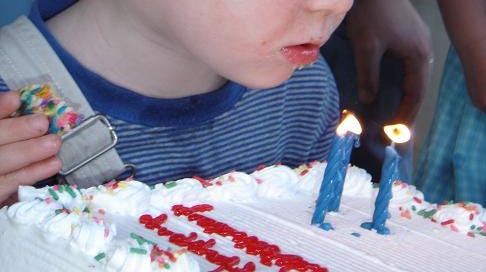On Autism Awareness Day, Let's Actually Do Something
Why Make Changes To Help Disabled Kids, Adults, and Their Families?
My son with autism is turning 19 in a couple of weeks; in June, he’ll graduate from high school. I took a month-long break from writing education articles to find a place for a kid who doesn’t fit neatly into a box. Our tentative plan is that he’ll attend the public school’s 18-21 program, where he’ll learn job skills and smooth out his autistic quirks, and then take math and computer classes at the community college in the evening.
In addition, I’m continuing to work on the government paperwork process. Our lawyer already helped us set up his special needs trust and gain guardianship. I am attending evening workshops to learn how to apply for Social Security and Medicaid, where I’m learning that parents have to manage their disabled child’s programs, training, and support for the rest of of his or her life; it can be a full-time job, they tell me.
Today is Autism Awareness Day. I don’t really care about inspirational “thoughts and prayers” on Instagram. I just spent two hours on the phone with the Social Security office, so I’m not in the mood for pictures of blue puzzle pieces. It would help me and many others more, if you voted for political officials, who have a disability tab on their website. Vote for folks who will make some real changes to improve the lives of people with disabilities and their families.
Theoretically, most people want a better world for disabled people, but individuals aren’t excited about personally making major changes or sacrifices. In political science lingo, this is called a collective action problem. One of the purposes of government is to overcome collective action problems like collecting taxes, providing healthcare for the elderly, and protecting the nation with troops and nukes. So, disability problems can be overcome given the right conditions. With an educated public and smart ideas, we can improve the status quo.
Changing consciousness and then developing robust programs is a monumental, costly task. Why should we bother?
Simply put: making these changes is the right thing to do. As we move towards a more compassionate world that considers the rights and needs and past injustices towards minorities and LGBT community, we have to also pay attention to disabled folks. If we want to live in a more fair world, then we have to eliminate the obstacles faced by this community.
There are also practical considerations. If we do not support the disabled community, then women will stop having children. There’s a 15 percent chance that a child will be born with a disability, which might require one parent to give up career aspirations, drastically reduce family income, and require life-long support. Knowing those facts, many women are going to say, “nah.” Given a choice between an exciting, fulfilling, lucrative career and round-the-clock, life-time caretaking, some women might decided that becoming a parent is just too risky.
If we want women to take that risk of childbearing, then we have to provide them with a certain kind of insurance in case things go wrong in utero. Women need to know that they won’t be forced to shoulder the burden of caretaking entirely on their own, so they will have the same quality of life as other parents. As things stand right now, I might not recommend that any ambitious young woman become a parent. The risks are too high.
But most importantly, we need to make changes, because everyone benefits from a world where disabled people are treasured. The world is a more stimulating, creative, happy place, when we have a diversity of abilities around us. Some of these folks are vessels for joy, others have a certain magic and creativity. Even the most disabled individual reminds us of our common humanity and takes us away from our hyper-competitive world.
Currently, society demands achievement that is pursued at all costs. Young people swim in a toxic competitive world, where only the strongest survive. Those who can manage the mental steeple chase of suburban high schools and make it to Harvard become “excellent sheep.” Those who don’t, which is the vast majority of young people, have a lot of anxiety about their future. Instead of living an environment that only works for the .1%, why not structure the world to benefit the 99%. A society that embraces imperfection, rather than achievement, is a better place for everyone.
By thinking hard about disability issues, it forces us to rethink our very definition of “normal” and to examine our own oddities, quirks, and impairments. By championing the cause of disabled folks, we also give ourselves permission to wave our freak flags and to not mask the very things that make us interesting.
So, on this Autism Awareness Day, let’s go beyond blue puzzle pieces on an Instagram post. Let’s actually do something. Let’s support political leaders that fund excellent special education system, that put less demands on parents, that create suitable housing and job programs for adults, that reduce the amount of time spent filling out useless paperwork.
And let’s take the time to treasure the disabled folks in our lives, because it is the system that is broken, not them. My kid is perfect.
Picture Above and Below: When Ian was three, he could not blow out the candles on his cake. That was part of the autism. He needed a little gust of air from Steve behind him to finish the job.




